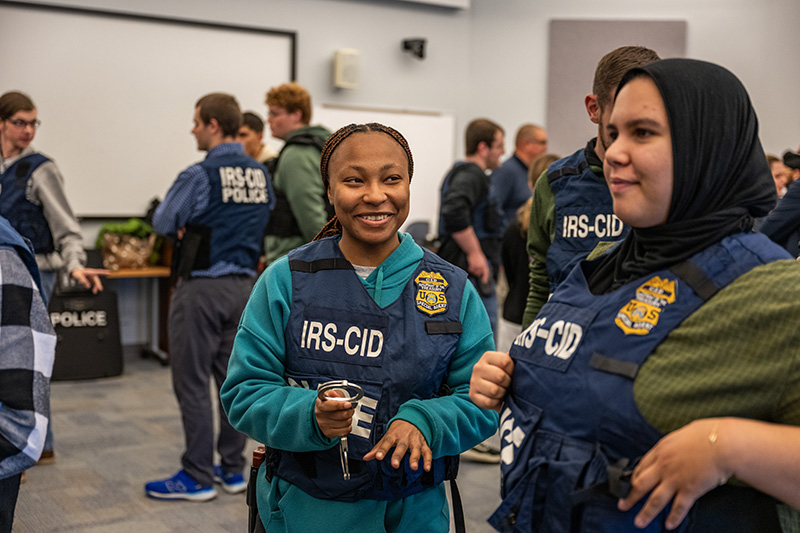
Moravian hosted an IRS Citizen Academy in which students were tasked with solving a fake tax fraud crime. From examining evidence to arresting the perpetrator, they experienced the entire procedure.
Thursday, October 17, began like any other day at Moravian University, but it ended with an arrest of two alumni on campus for a tax crime.
Moravian hosted the IRS Citizen Academy, a day-long event in which students participated in a simulation of a mock criminal investigation. The goal of this academy is to provide students with a firsthand look into what it’s like for IRS special agents to carry out a federal tax crime investigation and track illicit money from the crime to the criminal.
No. Alumni and IRS Special Agents Nick Sacco ’93 and Tyler Boyer ’07 didn’t actually commit tax fraud or get arrested, but Moravian students with an accounting major or in the criminal justice track in sociology portrayed IRS special agents and worked together to solve a crime and arrest the mock offenders.
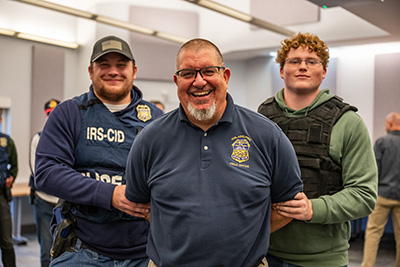
Daniel O’Conner, associate professor of practice in accounting and co-director of the accounting program, spearheaded the idea of bringing the IRS Citizen Academy to Moravian after an IRS special agent alum reached out to him at Moravian’s career fair in 2022. Then, Mark Koscinski, associate professor of practice in accounting and co-director of the accounting program, got on board, as did Rebecca Malinski, assistant professor of sociology, and the Dean of Moravian’s School of Business and Economics, Sonia Aziz.
“This is just one of the many ways we’re committed to transforming our students’ lives through experiential learning,” Aziz said to the students. “This opportunity will show how the skills you’re developing in accounting or sociology can be used to make a real impact and highlight the diversity of jobs that are available.”
Moravian was also happy to collaborate with DeSales University for this event. Seven of its accounting students participated in the citizen’s academy.
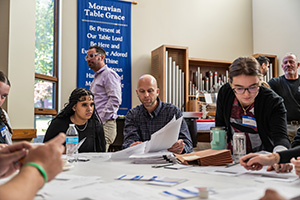
“We can only do so much in the classroom to simulate work life. Anytime, especially in our discipline, our students can practice it in a fun and meaningful way—it can inspire them to think about careers they never thought about doing,” O’Conner says.
The IRS CItizen Academy was held in the Bahnson Center and led by IRS Special Agent Robert Glantz. Students were broken into four groups, each with a different IRS special agent on hand for assistance as they analyzed tax returns and bank accounts and formulated interview questions for suspects. They experienced what it’s like to interview persons of interest, conduct surveillance, and present evidence to a judge (Mark Koscinski dressed in a judge’s robe) to ask for different warrants.
Students also participated in a defensive tactics training session, in which they were introduced to IRS protective vests, gun holsters, handcuffs, and the purpose of a police shield, halligan, and battering ram for entering a building.
Glantz provided insights on what students may have missed within the investigation, what they should focus on, and more—trying to teach them in a day what most agents go through in a year.
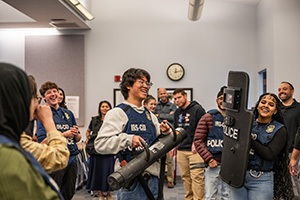
Dylan Lazar ’25, a sociology major in the criminal justice track, says his experience in the IRS Citizen Academy gave him a new perspective on potential career paths. While he’s still interested in forensics, he’s now open to the idea of becoming a special agent or even an investigative analyst.
To become an IRS special agent, Moravian students need 15 credits, or four classes, in accounting and three related business classes, but students may graduate with a bachelor’s degree in any major.
“I love being able to, in part, help students with what they want to do. We’re trying to let them know that they can try four to five different jobs before finding out what they want to do with the rest of their lives,” Glantz says.
For an IRS special agent, the job is different every day. Agents interact with various people, conduct surveillance, handle undercover operations, and spend days both inside and outside the office. But there are also more positions in this field than just that of a special agent. For example, investigative analysts assist agents with high-level research by working through various databases to gather critical information. And if students want an alternative to the law enforcement side of the IRS, a career as an internal revenue agent on the civil side can be just as rewarding. With an accounting degree or just 24 credits in the accounting field, students could be auditing small businesses and analyzing tax returns without the long hours of a public accountant during tax season.
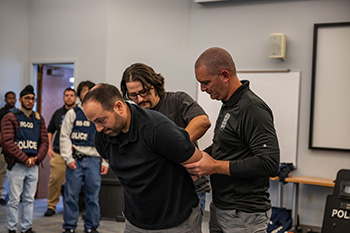
Sean Superka ’26, an accounting major, had an internship at a local private accounting firm and was leaning toward a career at a private company, but after this experience and learning about federal career benefits, he’s now weighing his options.
As for Yeilyn Justo ’27, a sociology major in the criminal justice track, the IRS Citizen Academy solidified her desire to become a detective. “It made me love it even more,” she says.
As Aziz describes, opportunities like this are a way to ensure Moravian University students get experiences that will prepare them for success in future careers.—Davin Fields